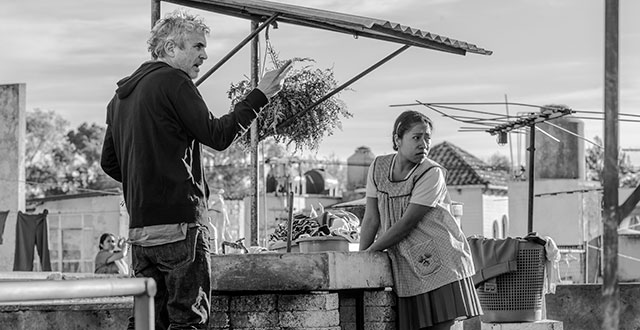Alfonso Cuarón’s Roma is as Reflective as it is Timely

Although the title of the film is Roma, it’s not named after the Italian city. Rather it’s named after the Mexico City neighborhood where director, Alfonso Cuarón grew up. European film influences are evident throughout; from the name that’s shared with the black & white Fellini classic, to a sensory-loaded soundtrack and ethereal look. Yet as it slowly reveals itself, it becomes clear that Roma reaches to be more than just another film.
Cuarón meticulously sets up the dicotomy for audiences. While viewpoints about our neighbor to the south differ greatly within our society, everyday life in Mexico is portrayed as distinctly not foreign. In fact, Cuarón highlights common struggles that can be found in any country, social class or time period.
Roma plays out as a year in the life of a 1970’s middle-class family in Mexico City. The film’s director, writer, producer… Alfonso Cuarón, dedicated the film to his childhood nanny, “Libo,” a Mixtec woman from Oaxaca. Roma shows the power of memoir, as it’s Cuarón’s own childhood memories that make up the story.
In Roma, Cleo is a nanny, but her love and concern for the children she cares for goes above and beyond any job requirement. And the love the family returns to her is clear. Cleo faces a personal struggle after her boyfriend abandons her. When the father abandons the family, a kinship between the mother, Sra Sofía, and Cleo develops.
Alfonso Cuarón is best known for his work on major hits Gravity, Children of Men, and Y Tu Mamá También. Approaching Roma as a very personal project, he made sure everything in the film was well-researched and era-authenticated. Adding to the authenticity and impact, he cast Yalitza Aparicio as “Cleo.” Yalitza is also from Oaxaca and is already getting Academy Award “buzz” for her performance; her first acting role ever. What an accomplishment that would be for a woman who in a different time or setting could be a “Libo” herself. Yalitza adds a natural sincerity and integrity to the film. And the whole cast meshes with the same believability.
In an interview with Variety, Cuarón mentions that as a child he didn’t recognize the class distinctions happening within his home. With Roma, he shows that he’s fully versed in the situation now. The film proves that some things in life are universal, good and bad, and it can merely be economics and the opportunities to earn a good living that divide us.
The film pre-launched in some theaters and festivals, and hopes to continue screening in movie theaters. Luckily, it’ll also be available on Netflix.
Wherever and whenever you see it, Cuarón’s Roma is enjoyable on many levels; so just sit back, soak up the rich cinematography and let the powerful storytelling wash over you.
Image credit: Image in slide show of Alfonso Cuarón, courtesy of Secretaría de Cultura Ciudad de México. Resized to fit slideshow.











